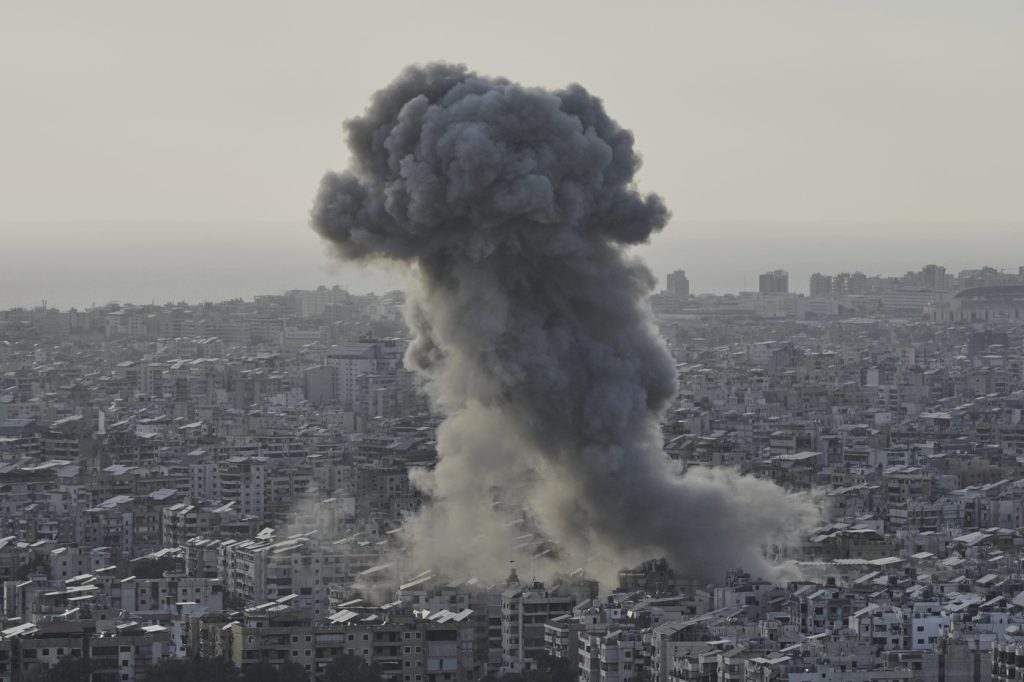On Sunday, Israeli jets conducted airstrikes on the southern suburbs of Beirut, marking the third attack in the region since a ceasefire began in late November. Just an hour prior to the strikes, the Israeli military issued a warning, stating that the operation targeted a precision-guided missile storage facility belonging to the militant group Hezbollah. The military claimed that storing such weaponry violates the terms of the ceasefire agreement that ended the Israel-Hezbollah conflict.
A large plume of smoke was reported rising from the area after the attack, which hit what appeared to be a metal tent situated between two buildings using three bombs. An Associated Press photographer on the scene confirmed seeing two burned and destroyed trucks inside the targeted hangar. Fortunately, there were no immediate reports of casualties following the strike.
Prior to the airstrike, the Israeli military indicated that it was targeting Hezbollah facilities in Hadath and urged residents to relocate at least 300 meters from the site. This warning was accompanied by two preliminary strikes intended to alert the locals. Witnesses in parts of the Lebanese capital reported hearing fighter jets overhead, and panic ensued as gunfire was discharged into the air to signal residents to evacuate the area.
During the last Israel-Hezbollah war, the southern suburbs of Beirut were frequently bombarded by Israeli forces, given Hezbollah's significant influence and support there. Israel views this region as a militant stronghold and has previously targeted prominent Hezbollah leaders within it, including their chief, Hassan Nasrallah, accusing the group of harboring weapons.
Lebanon's President Joseph Aoun condemned the Israeli airstrike, calling on the United States and France—who serve as guarantors of the ceasefire—to fulfill their obligations and exert pressure on Israel to cease its attacks. He warned that continued Israeli actions could destabilize the situation further and pose serious security threats to the region.
Jeanine Hennis, the U.N. Special Coordinator for Lebanon, took to social media platform X to express that the recent Israeli strike had generated panic and fear among the locals who were eager for a return to stability. She urged all involved parties to refrain from actions that could further diminish the ceasefire understanding and the implementation of the U.N. resolution that concluded the previous conflict.
Sunday’s strike followed two previous attacks on the same area, the first occurring on March 28, when Israel issued another warning, and the second on April 1, which was not announced in advance and resulted in the deaths of four individuals, including a Hezbollah official.
Sheikh Naim Kassem, a leader within Hezbollah, recently cautioned that if Israel's attacks did not cease and if the Lebanese government failed to address the situation, the group might have to consider different options. He also emphasized that Hezbollah's fighters would not disarm as long as Israeli troops remained in southern Lebanon and the Israeli air force continued to violate Lebanese airspace.
The U.S.-brokered ceasefire, which ended the 14-month long Israel-Hezbollah war, stipulated that Israeli forces withdraw from all Lebanese territories by late January, while Hezbollah was required to end its armed presence south of the Litani River along the Israel-Lebanon border. However, tensions remained high as earlier on the same Sunday, a drone strike in the southern Lebanese village of Halta resulted in one fatality. The Israeli military reported that this strike targeted a Hezbollah member involved in efforts to rebuild the group's military capabilities in the region.
According to recent statements by the Lebanese government, Israeli strikes have resulted in 190 fatalities and 485 injuries within Lebanon since the initiation of the ceasefire. Israel maintains that its operations are directed towards targeting Hezbollah officials and their infrastructure. Meanwhile, the Lebanese military has been gradually deployed in the southern region, urging the international community to intervene and pressure Israel to halt its attacks and withdraw from the five hilltops it occupies in Lebanese territory.











